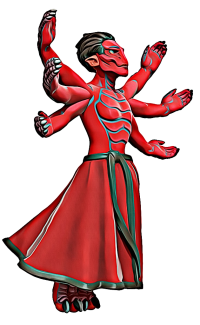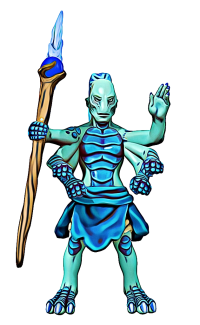Deities in Sewoch
While deities do exist for the Sewoch, they are not at all similar to Otani deities. In Otan deities live on another plane of existence, creating, destroying and interceding in the lives of mortals on their own whims. In Sewoch, the deities are ever present and always ready to converse with the faithful.
Sewochi deities are never intercessors. They do engage in whimsical activity, much as do the deities of Otan, however, they never interfere in the affairs of mortals. They set examples, and give detailed instructions to mortals on how to achieve a state of Temokiro. They are said to be an a continuous state of Temokiro themselves, even when engaged in whimsical affairs.
The other major difference with Sewochi deities is that they are shared across the two leading Sewochi religions. Practitioners of both Medigemi and Kilesa may call on the same deity for different reasons, but both acknowledge the same group of deities.
Arenigwade
Arenigwade is the god of love and self love. He is a jealous god, however, and is quick to stir to extreme emotions. At best Arenigwade will help the penitent to align their feelings for sexual and fraternal love into a positive step toward Temokiro. At worst, Arenigwade will enrage his followers into fits of anger and jealousy. It is said that this god brings the highest highs and the lowest lows of any of the Sewochi gods.
Arenigwade guides his followers toward love, an necessary step in the path to Temokiro. Followers must learn to love themselves, to love others, to love the path that they are on and most of all, the experience of love. Like their god, followers of Arenigwade will see their love quickly turn to anger if their paths toward love, and ultimately Temokiro, is blocked. These followers will lose their anger completely and immediately once the path is unblocked, and will return to the activity that increased their feelings of love.
Important steps in the path of Arenigwade include the mastering the experiences of:
- Love of self
- Love of others
- Love of community
- Love of universe
- Love of experience
Bicha
Bicha is the god of the Sun and the god of intellect. Bicha is depicted as a condescending god, taking pity on the less intelligent gods for their lack of knowledge or understanding. Even when others do understand, Bicha will take the natural stance that they do not understand things well enough to be of a concern. He will not tolerate those who try to correct him on the very rare occasions that he gets something wrong. His path to Temokiro is through a complete understanding of the universe.
Followers of Bicha believe that all knowledge comes from within and that they have 'a priori knowledge of all things in the universe. These followers will nonetheless, take up in-depth studies to remind their forgetful spirits of that knowledge they might have set aside. Bicha's followers will spend much of their time reading, studying nature and the movement of the sun, stars and planets. They achieve the state of Temokiro not when they understand, but fully experience the knowledge that they understand. This is done trough a combination of meditation and empirical observations.
Important steps in the path of Bicha include mastering the experiences of:
- Understanding the motion of Sewoch, the Sun, and the heavens
- Understanding the natural path from birth to death
- Understanding the relationships between elements
- Understanding causality (or lack thereof)
- Understanding the intricacies of time
Biritukanama
Biritukanama is the god of passion, sexuality and self-expression. Depicted as an orange-skinned god, Biritukanama will often pursue other gods for sex or other acts of intimacy. Sewoch gods being without gender or sexual orientation, gives Biritukanama a dual reputation, that of a welcome visitor and that of an unwelcome annoyance.
Biritukanama will announce his intentions for intimacy by thrusting their spear in the ground and proceeding to make love. Mortals, of course, may not resist the advances of a god, but the gods themselves may make protests, about which many legends have been written. Followers of Biritukanama are often found engaging in sexual activity for the simple purpose of experiencing an advancement toward Temokiro, and no interest in procreation.
Followers of the way of Biritukanama will eventually achieve Temokiro through self-expression, intimacy, sexual acts, and creativity. Followers may take up arts such as painting, music and drama to enhance their paths to [Temokiro]]. Their paths will include the following experiences:
- Passion for the arts
- Passion for intimacy
- Passion for sexual congress
- Passion for appreciation (for sexual or artistic merit)
- Passion for creation of the unique
Hamirawi
Hamirawi is depicted as a purple-skinned goddess who carries a lyre. While technically genderless, Hamirawi is often described as a precocious female, decrying the folly of all the other gods with their many varied and complicated paths to Temokiro. While Hamirawi plays her magical lyre, which has various effects on gods and mortals alike, she easily achieves the path to Temokiro by playing the Perfect Note. In legends, Hamirawi has been known to give the gift of Temokiro to those around her with this note.
Followers of Hamirawi will often take a keen interest in music, which has within it, various paths to Temokiro other than the one Perfect Note. Because of this comparatively quick path to Temokiro, her followers will engage in seemingly superfluous passions including a desire to commune with the divine. Followers of the way of Hamirawi will meditate on the oneness of all living things and their ultimate role in the universe. It is said that this in itself provides them a second path to Temokiro.
Followers of the path of Hamirawi will seek to experience the following:
- Knowledge of the spirit
- Knowledge of the connectedness of all spirits
- Knowledge of the divine
- Knowledge of the connectedness of the spirit and divine
- Knowledge of harmony
- Knowledge of the Perfect Note
Inigogo
indigo
Keyi
Meweledi
Moti
Semayawi








